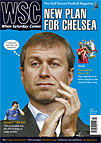 The long-running referee-bribery scandal is still a matter for the courts, but the football authorities are not allowing the legal niceties to get in the way and the casualties are mounting. Phil Town reports
The long-running referee-bribery scandal is still a matter for the courts, but the football authorities are not allowing the legal niceties to get in the way and the casualties are mounting. Phil Town reports
While the so-called Apito Dourado (“Golden whistle”) bribery case continues to trundle through the criminal courts four years after the events, the Portuguese League have taken some decisive action. In what has come to be known as the Apito Final (“Final whistle”), various clubs, club presidents and match officials have been found guilty of dirty deeds and dealt a range of penalties, including fines, suspensions, point-docking and, in one high-profile instance, relegation.
FC Porto and their charismatic president, Jorge Nuno Pinto da Costa, are accused of bribing match officials in two relatively meaningless league games during José Mourinho’s Champions League-winning season of 2003-04. On one occasion they allegedly provided prostitutes, code-named “fruit” and “coffee with milk”, on request. As with all the similar accusations in Apito Dourado, this has yet to be proven in a court of law, but the disciplinary committee of the league couldn’t wait; it borrowed the public prosecutor’s evidence, including thousands of tapped mobile-phone conversations, and came to its own conclusions: Pinto da Costa and, by extension, his club were guilty.
At the press conference to announce the decision and penalties, committee chairman Ricardo Costa confirmed, perhaps with a shade too much relish, that Porto were to be docked six points and Pinto da Costa suspended for two years. The champions opted to accept the decision so that the points would be docked from this season’s already insurmountable 20-point lead over their nearest rivals, Sporting. But what seemed like a clever move at the time may have backfired: failure to appeal has been seen as tantamount to an admission of guilt, which leaves Pinto da Costa, who has appealed, hanging out to dry. UEFA, meanwhile, may look at the club’s Champions League eligibility.
Porto’s and Pinto da Costa’s alleged offence was “attempted” corruption: there was an offer of reward and a request for favours, but it was concluded that there was no practical result on the pitch. The same went for União de Leiria – already doomed, they lost three valueless points. Unfortunately for Boavista, the committee thought that Porto’s neighbours had indeed benefited in certain games and were thus guilty of “consummated” corruption; Valentim Loureiro, then president of the league (which is ultimately in charge of officials), and his son João Loureiro, Boavista president at the time, had allegedly “put pressure on referees”. The penalty was relegation and a fine of €180,000 (£140,000). They are 105 years old and were champions only seven years ago, but chronic financial problems mean they could now go to the wall.
However, Boavista have appealed, as has everyone else apart from Porto. The next stop is the Portuguese Football Federation’s council of justice, which will have to digest 110,000 pages of reports and hand down a decision before June 11, when last season’s results and tables are due to be officially approved. But the council is notoriously stingy when it comes to appeals and, if it rejects them, Pinto da Costa for one has said that he could well take the case to the European civil courts, meaning that the process may drag on into next season.
Meanwhile, Apito Final has thrown up various legal and ethical quandaries. The league, as a private association, have used evidence from a criminal trial, notably phone taps that are already of dubious constitutional validity, to support their decisions. Club presidents have been penalised with suspensions of months, when the match officials involved are banned for years (six, in the case of referee Augusto Duarte). Clubs accused of very similar acts of corruption received very different penalties.
It is also not clear what will happen if decisions from Apito Dourado, when they are finally handed down, contradict Apito Final. Will the football authorities have to retract their decisions? And if so, what if the season has already begun or even finished? But despite doubts as to their fairness, constitutionality and practicality, many have welcomed Apito Dourado and its bastard offspring Apito Final as being the brooms needed to at last sweep corruption from the Portuguese game. The fact that they are happening at all is, to many, a healthy sign.
From WSC 257 July 2008